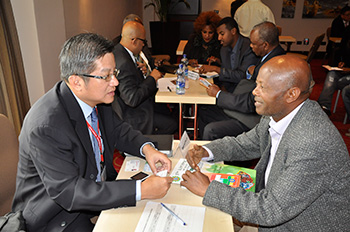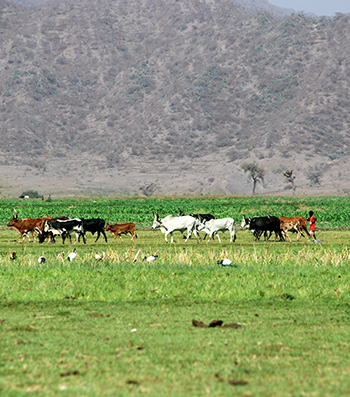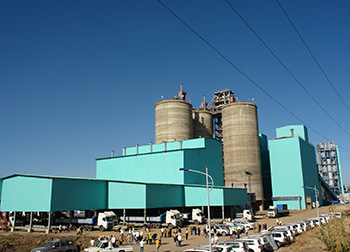Ethiopian Investment Agency: One-stop investment center for investors in Ethiopia
Fitsum Arega, Director General of Ethiopian Investment Agency
Ethiopian Investment Agency confirms horticulture (flowers), agriculture and manufacturing (textiles, leather) attract majority of FDI flows into Ethiopia. The Agency is currently working hard to transform itself into a one-stop investment center for investors.
Interview with Fitsum Arega, Director General of Ethiopian Investment Agency

Can you give me your overview of the investment climate in Ethiopia, as well as your outlook for 2014 and onward?
Thank you very much. First of all, in the last decade Africa has become very attractive for investment. The economy has been growing more than 5.5% per annum in terms of GDP and the Ethiopian economy has been growing more than 10% per annum on average for the last decade. This shows that Ethiopia is setting the pace for Africa and Africa is also becoming a very good destination for investment. Last year and this year, the trend has been continuing and we are expecting that in the coming years, especially in the manufacturing sector and in the commercial farms, Ethiopia will be increasingly attractive for investment.
There has been a lot of news in recent years about the economic growth in Ethiopia. What strategy are you pursuing to attract additional foreign direct investments?
First of all, what we are trying to do is create a very competitive investment policy. The policy has been reviewed many times to suit the requests of different investors. We have different incentive policies; for example, for any company that wants to bring in capital goods, construction materials, or spare parts, they can bring these in from overseas, 100% tax free, customs tax free. There are also tax holidays, ranging from two to ten years depending where they are investing and in what sectors they are investing, and if they are exporting, the incentives continue up to the raw material.  So we have a great internal environment to attract foreign direct investment in these productive manufacturing sectors, basically in agro-processing, textile and textile garments, leather and leather garments, and the like. This has been becoming very popular and so many companies have been asking and engaging in investment activities.
So we have a great internal environment to attract foreign direct investment in these productive manufacturing sectors, basically in agro-processing, textile and textile garments, leather and leather garments, and the like. This has been becoming very popular and so many companies have been asking and engaging in investment activities.
What is the impact of foreign direct investment regarding job creation and development for Ethiopia?
To give you an example of the impact of this foreign direct investment on job creation, we can take the horticulture sector and specifically, flowers. Before nine or ten years ago, there was no interest in flower investment in Ethiopia, but the government has provided a lot of support in this sector, making land available at a very cheap lease price, allowing companies to bring in 100% tax free for their greenhouses and the like, allowing companies to import different kinds of vehicles for transporting perishable items, constructing storage facilities at the airport, and the Ethiopian Alliance Cargo Facilities making it possible for these companies to export the product to Europe in a few hours. All of this support provided by the government has enabled this sector to grow very quickly and become the second-biggest flower sector in Africa – right after Kenya, which built such a sector over a period of more than 25 years. Furthermore, the sector has created over 200,000 jobs and more than 90% of the companies who invested in the flower sector (horticulture) are international companies, mainly from the Netherlands followed by a few other countries like Israel and Germany. This shows FDI is a very good source of creating jobs for locals, enabling export earnings. There are so many examples in other sectors as well.
We are working to become a one-stop center for investors. We have already started providing about 29 services that investors may need at different times throughout their project life.
As another example, there is a big Turkish textile company which has created positions for around 5,000 employees and it is still expanding. We can mention different kinds of sectors. To start, we preferred labor-intensive industries and that’s what we are getting. This is helping us create more jobs which is a very good way of eliminating poverty in the country.
In what sectors of the economy do you see more inflow of FDI?
The first one, as I mentioned, is horticulture which includes flowers, then agriculture (vegetables, fruits and the like), but flowers are the dominant part. The second is manufacturing, primarily in the textile and garment and leather and leather products industries. These are the major areas.
Can you talk to us about some of the recent projects in the pipeline, particularly the Turkish textile project? I think that will help growth in Ethiopia, with an expected $2 billion in export revenue and more than 60,000 jobs. Where does that project stand so far?
This project has been going on for the last five years and it is expanding. It is not the only project that is getting into manufacturing of textiles and garments. There are also others coming into the pipeline. Some of them you may be aware of, such as Icades. There is also another company coming in, George Shoe Corporation, which at the moment is mobilizing with machinery and the like. There is another Chinese company, Hojien, and others.
 Your government has been recently promoting investment opportunities to European Union investment communities. Can you comment on this?
Your government has been recently promoting investment opportunities to European Union investment communities. Can you comment on this?
From European countries, we believe there are so many companies who could come to Ethiopia and invest. Looking into what happened in the last decade, mostly from the Netherlands, we have attracted so many companies to invest in Ethiopia from Europe but it’s not enough. I can say the Netherlands are leading, followed by Turkey. There are some other companies like the British company Diageo, engaged in Ethiopia in the brewery industry.They acquired one of the biggest companies from the government through the privatization process and are working on expanding.
Heineken is another company investing in Ethiopia from Europe. There is also another French company investing in the brewery industry as well, but there are very few. There is a company called Pittards from the UK, investing in gloves and leather products. There are a few companies from Italy but there are not many. When we look into US companies, very few companies are coming. It is on a small scale. But we believe there are so many opportunities in Ethiopia to attract American companies.
For example, the AGOA helps us and helps them to view the opportunities. American companies know what is best for Americans so if they come and invest in Ethiopia, they can know in what sector they have to invest so they can export duty-free and tax-free through the AGOA initiative. We feel some new things are opening up; for example,  there is a new company coming from the US, I think in partnership with another European company, to generate electricity for a geothermal source. They have allocated around 4 billion US dollars for that. They have already made an agreement with the Ethiopian Power Corporation to generate and supply the electricity to this Ethiopian company. It is a wonderful opportunity for us and it is a new way of opening. But all of this is not enough. What I mean is we may not be promoting enough to attract those companies who could have otherwise shown an interest in Ethiopia, so we have to work harder to promote Ethiopia.
there is a new company coming from the US, I think in partnership with another European company, to generate electricity for a geothermal source. They have allocated around 4 billion US dollars for that. They have already made an agreement with the Ethiopian Power Corporation to generate and supply the electricity to this Ethiopian company. It is a wonderful opportunity for us and it is a new way of opening. But all of this is not enough. What I mean is we may not be promoting enough to attract those companies who could have otherwise shown an interest in Ethiopia, so we have to work harder to promote Ethiopia.
Are there are any financing schemes available for these foreign companies, other than allocating land? Are there facilities in terms of financing offered by either the government or the private banking sector in Ethiopia?
I might say yes, but the first thing we are trying to do at FDI is attract investors that meet three qualifications. First, we believe they have expertise and technical skills for technology transfer; second, they have market access; and third, they are capable of financing themselves in the first place. But for various reasons, maybe other countries are providing some finances or for mitigating risk, they require some financing from local sources. In that case, for capital projects, we have a government bank depending on the feasibility. It’s a development bank and may allocate some loans based on the feasibility. Again, it has to be a 95 to 100% export product. In that case, there might be funding available. But for working capital, all private banks and even government commercial banks are ready to finance the projects and they are doing this.
What is your vision for the agency for the future?
We are working to become a one-stop center for investors. There are so many services that investors require at different stages of their investment project. They used to get those services from different government agencies from different sectors but now here at the agency, we are planning to be this one-stop shop for investors.  We aren’t just planning, we are working toward this. We have already started providing about 29 services that investors may need at different times throughout their project life. They may not need all the services; some projects need one and others may need three or five. Depending on the sectors they are in, we are here to serve them and provide them with the services they need.
We aren’t just planning, we are working toward this. We have already started providing about 29 services that investors may need at different times throughout their project life. They may not need all the services; some projects need one and others may need three or five. Depending on the sectors they are in, we are here to serve them and provide them with the services they need.
As an example, we issue an investment license which is the first important document to be considered a legal operator in this country to import without getting an investment business license. Any capital groups that once complete their project need a business license to operate. They used to get that from the Ministry of Trade but now they don’t have to go there; we issue it here. For export employees, they need a work permit. They used to get that from different government ministries, the Ministry of Works and Social Service, but now we issue that from our office. We process Visas for investors and provide customs clearance for capital goods. We issue the permit and they don’t have to get the permit from customs authorities. They just go to collect their goods. There are so many documents that they need to authenticate and we do them here. There are different services that in the past used to be done in different offices and now we are mandated to provide them here. There are still different services that we are not providing but we are working toward becoming a one-stop shop. We are dreaming about being the best in Africa.
FAIR USE POLICY
This material (including media content) may not be published, broadcasted, rewritten, or redistributed. However, linking directly to the page (including the source, i.e. Marcopolis.net) is permitted and encouraged.